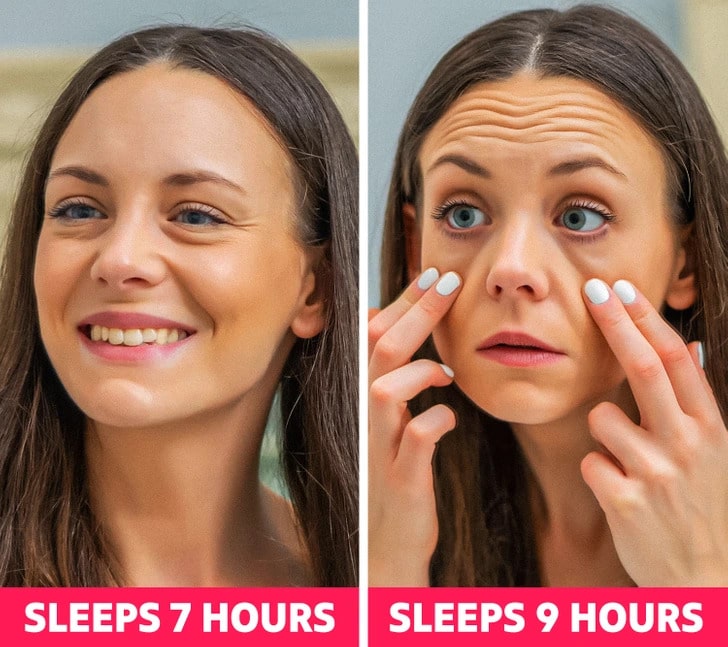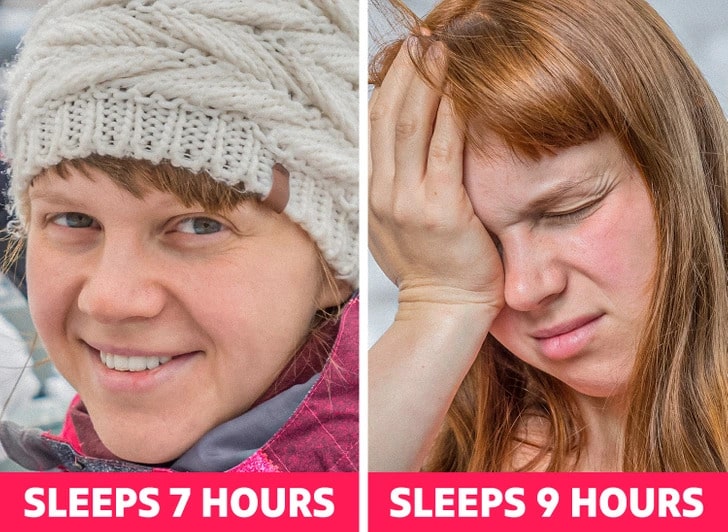The detrimental consequences of sleep deprivation on one’s health are widely acknowledged. However, it’s important to recognize that excessive sleep, too, can have adverse effects on overall well-being and may prove equally damaging. In line with scientific recommendations, individuals aged between 26 and 64 are advised to target 7 to 9 hours of daily sleep, as any deviation from this range could potentially impact health.
Weight Gain:

Scientific research has linked both insufficient sleep (less than 5 hours per day) and excessive sleep (over 9 hours per day) to weight gain. Strikingly, those who sleep 7 to 8 hours a day tend to find it easier to maintain a healthy weight. This underscores the significance of appropriate sleep in weight management, complementing exercise and diet.
Under-Eye Circles:
While sleep deprivation is often tied to dark circles and under-eye bags, excessive sleep (over 9-10 hours per day) can yield a similar effect. Inadequate sleep can render the skin pallid, making blood vessels more pronounced, thereby contributing to the formation of under-eye bags.
Cardiovascular Risk:

The link between oversleeping and cardiovascular disease is not entirely understood, but research indicates that individuals sleeping for 9 to 11 hours daily face an elevated risk of developing arteriosclerotic heart disease. Conversely, those who sleep 7 to 8 hours daily are at a lower risk.
Cognitive Impairment:
It’s common knowledge that sleep deprivation impairs cognitive function. Surprisingly, excessive sleep also hampers quick decision-making, problem-solving, and memory function. Researchers emphasize that 7-8 hours of daily sleep are crucial for maintaining cognitive well-being.
Skin Health:

Research reveals that our sleep patterns significantly impact our skin’s condition. Inadequate sleep can lead to skin dryness, while oversleeping can have similar effects. This is because spending more than 8 hours in bed can disrupt the body’s hydration balance, potentially leading to premature wrinkles and sagging skin.
Weakened Immune System:
Excessive sleep can have detrimental effects on the immune system, including increased inflammation in the body. Studies have identified elevated cytokine levels in the blood of individuals who oversleep, indicating a heightened response to infection.
Acne Development:

Prolonged lack of sleep can contribute to the development of acne. Elevated cortisol levels, associated with stress, can lead to overactive sebaceous glands, clogging pores and causing acne.
Susceptibility to Depression:
Sleeping excessively increases the risk of depression. While insomnia is commonly linked to depression, research suggests that approximately 15% of people with depression sleep for more than 9 hours a day, which can worsen their symptoms.
Headaches:

Oversleeping can disrupt serotonin levels and lead to headaches. Even individuals with good sleep habits who occasionally oversleep, such as on weekends or during vacations, may experience headaches upon waking up. Additionally, excessive time in bed can contribute to or exacerbate back pain.
Impulsiveness:
Researchers at Clemson University have uncovered a correlation between sleep and self-control. Inadequate sleep can lead to impulsive behavior and a reduced ability to resist temptation, potentially resulting in regrets over actions and decisions.
Perceived Aggression:

Recent research from UC Berkeley suggests that lack of sleep can impair the accurate interpretation of facial expressions. When fatigued, individuals may misinterpret neutral expressions as aggressive, leading to misjudgments. This is particularly relevant for professionals like medical practitioners and law enforcement officers who often grapple with sleep deprivation due to long work hours.


